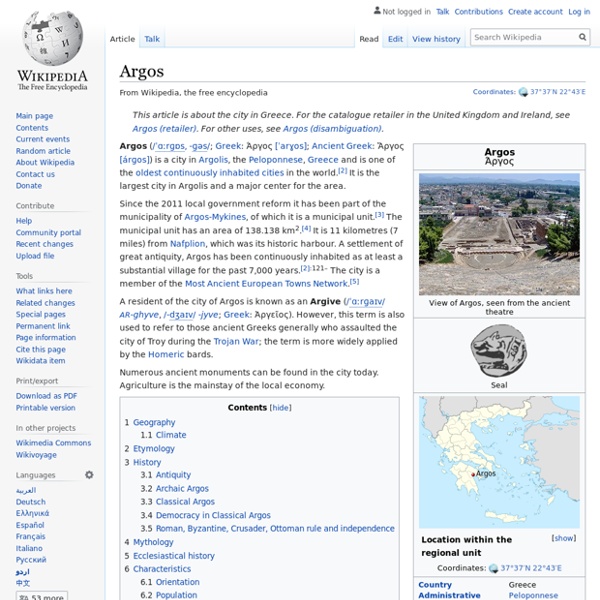Calydon
Greek city in ancient Aetolia The Laphrion sanctuary plateau of Calydon with Varasova mountain on the background. Calydon or Kalydon (; Ancient Greek: Καλυδών) was a Greek city in ancient Aetolia, situated on the west bank of the river Evenus, 7.5 Roman miles (approx. 11 km) from the sea.[1] Its name is most famous today for the Calydonian Boar that had to be overcome by heroes of the Olympian age.
Athens
Capital of Greece Capital city in Central Greece, Greece Athens ( ATH-inz;[3] Greek: Αθήνα, romanized: Athína [aˈθina] ( Classical Athens was a powerful city-state that emerged in conjunction with the seagoing development of the port of Piraeus.
Jason
We ask you, humbly: don't scroll away. Hi, reader in Canada, it seems you use Wikipedia a lot; that's great! This is the 6th appeal we've shown you. It's awkward, but this Thursday we need your help.
Aetolia
Region of Ancient Greece Aetolia (Greek: Αἰτωλία, romanized: Aἰtōlía) is a mountainous region of Greece on the north coast of the Gulf of Corinth, forming the eastern part of the modern regional unit of Aetolia-Acarnania. Geography[edit]
Elis
Region of Ancient Greece Ancient regions of Peloponnese (southern mainland Greece) The local form of the name was Valis, or Valeia, and its meaning, in all probability was, "the lowland" (compare with the word "valley").[citation needed] In its physical constitution Elis is similar to Achaea and Arcadia; its mountains are mere offshoots of the Arcadian highlands, and its principal rivers are fed by Arcadian springs.[3] According to Strabo,[4] the first settlement was created by Oxylus the Aetolian who invaded there and subjugated the residents. The city of Elis underwent synoecism—as Strabo notes—in 471 BC.[5] Elis held authority over the site of Olympia and the Olympic games.
Byzantine Empire
Roman Empire during Late Antiquity and the Middle Ages The Byzantine Empire, also referred to as the Eastern Roman Empire or Byzantium, was the continuation of the Roman Empire in its eastern provinces during Late Antiquity and the Middle Ages, when its capital city was Constantinople. It survived the fragmentation and fall of the Western Roman Empire in the 5th century and continued to exist for an additional thousand years until it fell to the Ottoman Empire in 1453.
Laocoön
Trojan priest in Greek and Roman mythology Laocoön (;[1][2][Note 1] Ancient Greek: Λαοκόων, IPA: [laokóɔːn]), the son of Acoetes, is a figure in Greek and Roman mythology and the Epic Cycle.[3] He was a Trojan priest who was attacked, with his two sons, by giant serpents sent by the gods. The story of Laocoön has been the subject of numerous artists, both in ancient and in more contemporary times.
Siege of Melos
Peloponnesian War, 416 BCE The Siege of Melos occurred in 416 BC during the Peloponnesian War, fought between Athens and Sparta. Melos is an island in the Aegean Sea roughly 110 km east of mainland Greece. Though the Melians had ancestral ties to Sparta, they chose to remain neutral in the war. Athens invaded Melos in the summer of 416 BC and demanded that the Melians surrender and pay tribute to Athens or face annihilation. The Melians refused, so the Athenians laid siege to their city.
Christopher of Mytilene
Christophoros of Mytilene (Greek: Χριστόφορος Μυτιληναῖος, Christophoros Mytilenaios; ca. 1000 – after 1050) was a Greek-language poet living in the first half of the 11th century. His works include poems on various subjects and four Christian calendars. Biography[edit]
Oeneus
Oeneus was a king of the area of Calydon in Greek mythology, son of King Porthaon and Queen Euryte. He married Althaea, with whom he had a number of children, including Deianeira, Meleager, Toxeus, Clymenus, Periphas, Gorge, Eurymede, Perimede and Melanippe. When Artemis sent a huge boar, called the Calydonian Boar, in his lands to ravage them because he had forgotten to honour the goddess, Oeneus asked his son Meleager to gather a party of heroes to kill the creature. The party consisted of Meleager, Atalanta, and Meleager's uncles; Atalanta played a major role in successfully hunting down and killing the boar.
Milos
A volcanic Greek island in the Aegean Sea, just north of the Sea of Crete Place in South Aegean, Greece Milos or Melos (; Modern Greek: Μήλος [ˈmilos]; Ancient Greek: Μῆλος Melos) is a volcanic Greek island in the Aegean Sea, just north of the Sea of Crete. Milos is the southwesternmost island in the Cyclades group.



